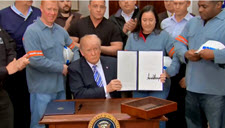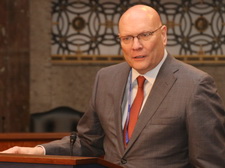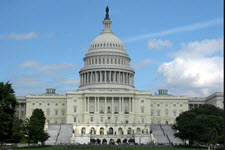Despite pushback from GOP leaders, congressional members and allies overseas, President Trump yesterday authorized levies of 25 percent on imported steel and 10 percent on aluminum to take effect March 23, while exempting Canada, Mexico and potentially other countries based on a country-by-country review of bilateral security agreements. (MarketWatch, March 8 and Bloomberg, March 9)
 |
President Trump authorized levies of 25 percent on imported steel and 10 percent on aluminum. |
The Presidential Proclamation exempts Canada and Mexico based on renegotiation of terms in the North American Free Trade Agreement (NAFTA) and includes a degree of flexibility for exempting other nations.
Roundtable President and CEO Jeffrey DeBoer noted the commercial real estate industry’s concerns, stating “For every job in the steel production industry, there are more than 50 jobs in the US construction industry (140,000 vs. 7-10 million). New tariffs on construction materials like steel could have the unfortunate, unintended side effect of raising construction costs and reducing jobs in real estate development. Exemptions will be important to mitigating the harm to the US economy.”
In response to Trump’s initial tariff announcement last week, Senate Majority Leader Mitch McConnell (R-KY) commented on Tuesday, "There is a lot of concern among Republican senators that this could sort of metastasize into a larger trade war.” (NPR, March 8)
 |
Roundtable President and CEO Jeffrey DeBoer: "New tariffs on construction materials like steel could have the unfortunate, unintended side effect of raising construction costs and reducing jobs in real estate development. Exemptions will be important to mitigating the harm to the US economy." |
A March 7 letter to Trump from 107 House Republicans, including Ways and Means Chairman Kevin Brady, expressed concern that “adding new taxes in the form of broad tariffs would undermine” the economic benefits in recently-passed Tax Cuts and Jobs Act legislation. The letter also suggests conditions for imposing tariffs to minimize negative consequences.
European Central Bank (ECB) President Mario Draghi said in a news conference yesterday, “If you put tariffs against what are your allies, one wonders who the enemies are.” Discussing the potential effects of the tariffs, he added, “Is there going to be a retaliation or not? What’s going to be the response of the exchange rate? …and the effect on confidence is very difficult to assess.” (CNBC, March 8)
The tariff announcement comes after a recent White House infrastructure proposal that seeks to leverage $200 billion in federal funding to leverage $1.5 trillion in local, state and private funding over the next decade. Higher tariffs on imported steel and aluminum could present new challenges to obtain the raw materials needed for extensive infrastructure projects. Funding options for the Trump administration’s infrastructure proposal were discussed during a March 6 House Transportation and Infrastructure Committee that featured Transportation Secretary Elaine Chao. (Hearing, March 6)
The Roundtable joined an industry coalition in filing an amicus curiae brief on March 5 with the U.S. Supreme Court in South Dakota v. Wayfair, Inc., No. 17-494 – a case that addresses the constitutionality of states’ authority to collect sales and use taxes on Internet consumer purchases. (SCOTUSblog)
 |
The Roundtable joined an industry coalition in filing an amicus curiae brief on March 5 with the U.S. Supreme Court in South Dakota v. Wayfair, Inc., No. 17-494 – a case that addresses the constitutionality of states’ authority to collect sales and use taxes on Internet consumer purchases. |
After the high Court accepted Wayfair in January, the case has become the long-awaited judicial vehicle that may level the playing field between Internet-based retailers and “brick and mortar” stores. The industry amicus brief, drafted by former U.S. Solicitor General Seth Waxman and his colleague Ari Holtzblatt, urges the Supreme Court to overturn a pair of decades-old decisions (e.g., Quill Corp. v. North Dakota (1992) and National Bellas Hess, Inc. v. Department of Revenue of Illinois (1967). Wayfair directly challenges these pre-Internet opinions, which prohibit states from imposing tax collection obligations on web-based, catalog, and other retailers that lack an in-state physical presence.
In today’s e-commerce driven world, the brief notes, the law should focus on retailers’ economic rather than physical presence, and level the playing field for all retailers who have in-state sales above a certain threshold.
The brief explains how the outmoded court decisions continue to have damaging effects that reach far beyond actual brick-and-mortar outlets. “First, the loss of physical stores, many of which are integral to the social fabric of their communities, increases unemployment and creates a sense of dislocation among community residents. Second, the decline in the retail sector reduces the value of retail real estate, discourages further development of retail properties, and impedes innovation in the retail sector. Third, the lost revenue from sales, property, and income taxes threatens the ability of state and local governments to provide much-needed public services, including those that benefit online retailers,” the brief states.
The Roundtable joined The International Council of Shopping Centers, Investment Program Association, Nareit®, the National Association of REALTORS® , the National Multifamily Housing Council, NAIOP, the American Farm Bureau Federation and the South Dakota Farm Bureau Federation on the amicus brief, which re-iterates many points set forth by a real estate coalition in an initialamicus brief filed last November. (Roundtable Weekly, Nov. 3, 2017)
Trump Administration Solicitor General Noel Francisco also joined the wave of other submissions to SCOTUS on March 5. The Justice Department brief states, “In light of internet retailers’ pervasive and continuous virtual presence in the states where their websites are accessible, the states have ample authority to require those retailers to collect state sales taxes owed by their customers.” (Amicus brief of USA and Wall Street Journal, March 5)
SCOTUS is scheduled to hear oral argument on April 17 and is expected to render a decision by the end of June. (Roundtable Weekly, Jan. 12)
The Senate is expected to vote early next week on bipartisan Dodd-Frank reform legislation (S. 2155) that includes a Roundtable-supported measure to reform the Basel III High Volatility Commercial Real Estate (HVCRE) Rule, which would clarify specific requirements for acquisition, development, or construction (ADC) loans.
 |
The Senate is expected to vote early next week on bipartisan Dodd-Frank reform legislation ( S. 2155 ) that includes a Roundtable-supported measure to reform the Basel III High Volatility Commercial Real Estate (HVCRE) Rule, which would clarify specific requirements for acquisition, development, or construction (ADC) loans. |
The Economic Growth, Regulatory Relief, and Consumer Protection Act(S. 2155) represents the most significant change to financial regulatory law since 2010, when the Dodd-Frank Act was enacted. Among the financial issues it addresses, the Act would raise the amount at which banks are considered “too big to fail” – from the current $50 billion threshold to $250 billion – and provides additional relief for community banks and credit unions.
Amendments added this week to the Manager’s Amendment for S. 2155 include a bipartisan HVCRE measure that originated in the U.S. House of Representatives as the Clarifying Commercial Real Estate LoansHVCRE bill (H.R. 2148), introduced by House Financial Services Committee members Rep. Robert Pittenger (R-NC) and Rep. David Scott (D-GA). After passing the House by voice vote in November of last year (Roundtable Weekly, Nov. 10), the Senate Banking Committee took up an identical bill in February – S. 2405 – co-sponsored by Senators Tom Cotton (R-AR) and Doug Jones (D-AL).
Last Friday, the Roundtable and twelve other real estate organizations sent a comment letter urging all members of the Senate Banking Committee to take the necessary steps to enact S. 2405 by including the measure in the broader Dodd-Frank reform package (S. 2155).
The current HVCRE Rule is overly broad and includes many stabilized loans without construction risk in this HVCRE category, unduly burdening those loans with capital charges meant to protect banks from heightened construction risks. As a result, banks, including small community financial institutions, have been deterred from making this type of loan, which can represent up to 50 percent of a small bank loan portfolio.
 |
The Roundtable and twelve other real estate organizations sent a comment letter urging all members of the Senate Banking Committee to take the necessary steps to enact S. 2405 by including the measure in the broader Dodd-Frank reform package (S. 2155). |
The Senate’s HVCRE measure would clarify which types of loans should be classified as HVCRE loans to ensure they do not impede credit capacity or economic activity, while still promoting economically responsible commercial real estate lending. (Roundtable Weekly, Jan. 12).
Senate Banking Committee Chairman Mike Crapo (R-ID) and House Financial Services Committee Chairman Jeb Hensarling (R-TX) continue to work with their colleagues to advance bipartisan reform measure that will muster enough votes for passage in both chambers.
It remains uncertain whether Crapo’s efforts will attract the support of House Republicans, who must approve the bill before it can be sent to the President for his signature. Hensarling said yesterday that the updated Senate bill doesn’t go far enough and needs more provisions to reflect “the will of the House.” (BNA, March 9)
HVCRE reform is a is a top policy priority of The Real Estate Roundtable and its industry coalition partners, who have submitted numerous letters to policymakers since the measure was enacted in 2015. The Roundtable’s HVCRE Working Group played a critical role in drafting the measure and aiding efforts to advance legislative reforms. (Roundtable letter, March 2)
Financial regulation and its effect on commercial real estate lending will be a focus of The Roundtable’s April 25 Spring Meeting in Washington, DC.